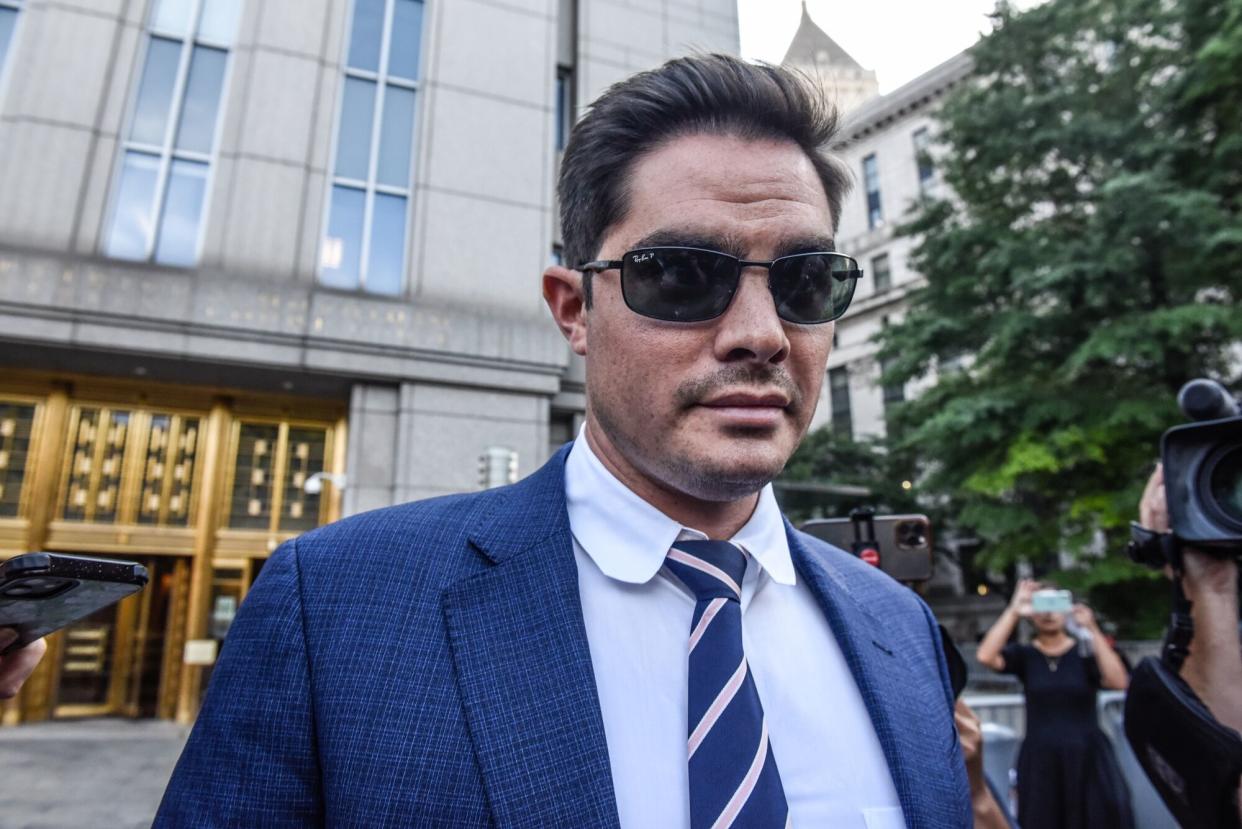Former FTX Executive Salame Sentenced to 7.5 Years in Prison

(Bloomberg) -- The former chief executive of FTX’s Bahamas subsidiary was ordered to spend 7 1/2 years in prison, the first of Sam Bankman-Fried’s close associates to be sentenced in the wake of the cryptocurrency exchange’s implosion.
Most Read from Bloomberg
World’s Largest Nuclear Plant Sits Idle While Energy Needs Soar
Treasuries Hit as US Sales Struggle to Lure Buyers: Markets Wrap
New BYD Hybrid Can Drive Non-Stop for More Than 2,000 Kilometers
For Private Credit’s Top Talent, $1 Million a Year Is Not Enough
Ryan Salame dropped his head as Judge Lewis A. Kaplan sentenced him in a Manhattan courtroom Tuesday, eight months after he reached a plea deal with federal prosecutors over the multibillion dollar collapse of FTX. While he was not accused of helping FTX founder Sam Bankman-Fried steal about $10 billion from customers, investors and lenders, Salame’s efforts to circumvent campaign donation laws jeopardized the stability of political life in the US, Kaplan found.
The prison term is more than prosecutors had asked for. The government said Salame, who pleaded guilty to violating campaign finance laws and operating an unlicensed money transmitter, deserved five to seven years behind bars, compared to the 18 months or less the defense advocated for.
“He knew precisely what he was doing, he knew why it was being done,” Kaplan said. “He knew it was illegal and the whole idea was to hide it from the world. Astonishing.”
Salame is the first of four former FTX executives to be sentenced on criminal charges stemming from the implosion of the exchange and sister hedge fund Alameda Research in late 2022. Kaplan’s judgment could indicate how tough he is inclined to be with Bankman-Fried’s colleagues who were by his side as the company rose to dizzying heights before crashing and rattling the crypto industry.
In handing down his sentence, Kaplan said there was a very substantial need for general deterrence as these types of crimes were “hard to detect on the fly” and hard to unravel “when everything goes to hell.” Addressing Salame’s supporters in the courtroom, including his mother and partner Michelle Bond, Kaplan said the 30-year-old could be out of custody in 4.5 years through a combination of good behavior and other incentives in the federal prison system.
Salame’s lawyers sought to distance him from the yearslong fraud that took place at the crypto exchange, arguing he was as shocked as anyone.
“And he was duped, as was everyone else, into believing that the companies were legitimate, solvent and wildly profitable,” his attorneys wrote in a memo filed in court ahead of sentencing.
His attorney Jason Linder described Salame as “merely a tool” who operated under the thrall of Bankman-Fried.
Salame made millions in political donations while at FTX, drawing on loans from Alameda Research and acting as a straw donor for Bankman-Fried. In a text message sent to an unnamed confidante in late 2021, Salame described Bankman-Fried’s desire to donate to both sides of the aisle in a bid to influence crypto policy.
The offending came at a time when the state of political life in America was in jeopardy, Kaplan said, and the amount of “money sloshing around the political system” was a contributing factor.
“Efforts like those taken by Mr Salame and Bankman-Fried only make matters worse,” he said. Salame also pleaded guilty to allowing FTX customers to deposit fiat currency into a US bank account without obtaining a license, a violation that has been levied against several crypto industry players over the past decade.
Addressing the judge and reading from a single-page statement, Salame said he truly believed he was helping FTX customers move fiat currency on and off the exchange.
“There are no excuses for violating the law and for that I apologize to the court and the US,” he said.
Prosecutors and the defense offered contrasting portrayals of the accountant turned crypto whiz, from someone who helped commit one of the largest campaign finance offenses in US history to a low-key family man who raised money for charity in his spare time.
The government’s case against Bankman-Fried was supported by three key cooperating witnesses – former FTX co-founder Gary Wang, chief engineer Nishad Singh and Alameda Research CEO Caroline Ellison. They all pleaded guilty to criminal charges and agreed to testify against Bankman-Fried with the hope of receiving lighter sentences. All three could face sentencing later this year.
Salame did not sign up as a cooperating witness, though his lawyers pointed to him being the first to tell Bahamian authorities about potential fraud at the exchange as it was collapsing. Salame also handed over more than 595,000 pages of documents to authorities investigating Bankman-Fried. In court Tuesday, Assistant US Attorney Samuel Raymond described Salame’s cooperation as “attempted if modest.”
Salame joined Alameda Research, FTX’s sister hedge fund, after meeting Bankman-Fried at a blockchain conference in 2019. He rose through the ranks to become a top executive, overseeing FTX’s move from Asia to the Bahamas. Salame was FTX Digital Markets CEO when the FTX group filed for bankruptcy, exposing the mingling of customer funds to buy real estate, make investments and grow Bankman-Fried’s empire.
Since then, Salame has been raising his newborn son, seeking treatment for substance abuse and preparing to forfeit $6 million, a business and two properties in his hometown of Lenox, Massachusetts to the US Government, his lawyers said.
Salame will self-surrender to the Bureau of Prisons to start his sentence on August 29.
Bankman-Fried was sentenced in March to 25 years in prison, an outcome he is planning to appeal.
The case is US v. Bankman-Fried, 22-cr-673, US District Court, Southern District of New York (Manhattan).
--With assistance from Hannah Miller.
(Updates top with sentencing term, details from court.)
Most Read from Bloomberg Businessweek
©2024 Bloomberg L.P.



